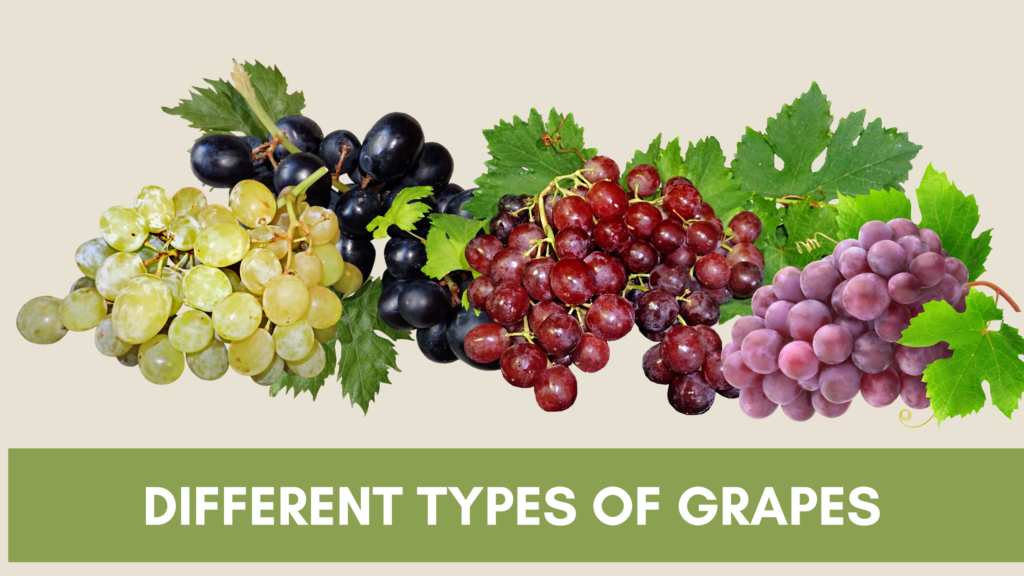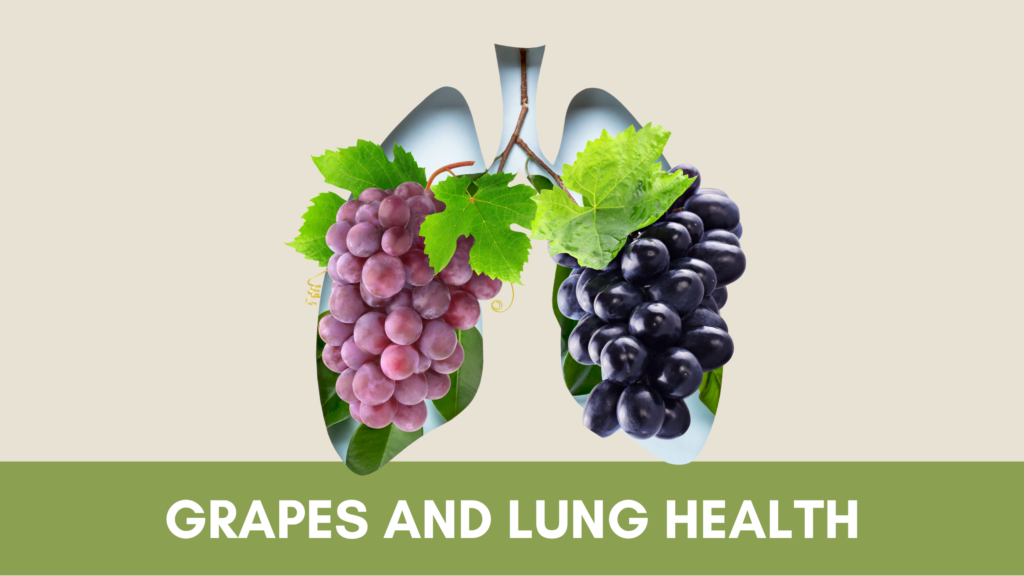Introduction
Did you know that grapes are not only delicious but also provide numerous health benefits? How are grapes healthy for you? In this comprehensive guide, we will discover how grapes boost your health and well-being and why you should consider adding them to your daily diet.
From their exceptional nutritional profile to the specific benefits for different aspects of your health, we will uncover the power of grapes.
So, let’s dive in and discover how grapes can be a game-changer for your overall wellness!
The Nutritional Value of Grapes
Before we delve into the myriad health benefits that grapes offer, let’s take a moment to understand the nutritional value they bring to the table.
Nutritional Composition
In their raw form, grapes consist of 81% water, 18% carbohydrates, 1% protein, and minimal fat.
For a 100-gram (3+1⁄2-ounce) serving of raw grapes, you receive 288 kilojoules (69 kilocalories) of food energy.
Additionally, this portion provides a moderate amount of vitamin K, accounting for 14% of the Daily Value, with no other micronutrients in notable concentrations (source Wikipedia).
Understanding the Different Types of Grapes
Grapes come in a variety of colors, including green, red, black, and white. Each type offers a unique blend of nutrients and health-promoting compounds.

The colors of the grapes are determined by the presence of certain pigments and antioxidants, which contribute to their specific benefits.
A Treasure Trove of Essential Nutrients
Grapes are packed with essential vitamins and minerals that nourish your body. They are a great source of vitamin C, vitamin K, and several B vitamins.
Additionally, grapes provide crucial minerals such as potassium and manganese, which support various bodily functions.
Antioxidant Powerhouse
One of the standout features of grapes is their high antioxidant content. Grapes contain a variety of antioxidants, including resveratrol, flavonoids, and anthocyanins.
These powerful compounds help protect your cells from damage caused by unstable molecules called free radicals, thereby reducing the risk of chronic illnesses.
Many studies suggest grapes can lower your risk of chronic diseases, including certain cancers and heart disease. (Percival, S.S. and West, R.L. (2013). Effect of Health-promoting Properties of Grapes, Including Resveratrol. In Bioactives in Fruit (eds M. Skinner and D. Hunter). https://doi.org/10.1002/9781118635551.ch9), and (Jun Yang junyang97@gmail.com Jun.Yang@pepsico.com & Yang-Yu Xiao (2013) Grape Phytochemicals and Associated Health Benefits, Critical Reviews in Food Science and Nutrition, 53:11, 1202-1225, DOI: 10.1080/10408398.2012.692408).
Grapes for a Healthy Body

According to a study, grapes emerge as a crucial component within diets enriched with fruits and vegetables, a recommendation endorsed by health authorities. Their widespread acceptance underscores their significant contributions to human health and the prevention of various diseases (Pezzuto, J.M., 2008. Grapes and human health: a perspective. Journal of agricultural and food chemistry, 56(16), pp.6777-6784.).
Cardiovascular Health
Research has shown that regular consumption of grapes can be beneficial for cardiovascular health.
Grapes help improve blood flow, lower blood pressure, and reduce the risk of heart disease.
The antioxidants present in grapes are particularly effective in protecting the heart and blood vessels from oxidative stress.
Maintaining Blood Pressure Levels
Hypertension, or high blood pressure, is a common health issue that can lead to serious complications.
However, incorporating grapes into your diet may help manage blood pressure levels.
Grapes are rich in potassium, which is known to have a positive impact on blood pressure regulation.
Beneficial for Diabetes Management
If you have diabetes, you’ll be pleased to know that grapes can be a healthy addition to your diet.
The moderate glycemic index of grapes means they have a minimal impact on blood sugar levels.
The presence of fiber also aids in controlling blood sugar spikes.
Enhancing Digestive Health
Grapes contain dietary fiber, which plays a vital role in maintaining a healthy digestive system.
Fiber helps regulate bowel movements, prevents constipation, and supports the growth of beneficial gut bacteria.
Including grapes in your diet can contribute to a healthier digestive tract.
Grapes and Lung Health

Protecting Against Respiratory Disorders
When it comes to lung health, grapes have a lot to offer. The antioxidants present in grapes help reduce the risk of respiratory disorders such as asthma and chronic obstructive pulmonary disease (COPD).
Additionally, the anti-inflammatory properties of grapes can help soothe irritated airways.
Anti-inflammatory Properties
Inflammation is your body’s natural response to injury or infection. However, chronic inflammation can lead to various health issues, including lung diseases.
Grapes contain anti-inflammatory compounds that can help reduce inflammation in the lungs, promoting better respiratory health.
Promoting Lung Function
Grapes are rich in nutrients like vitamin C and beta-carotene, which are essential for maintaining healthy lung function.
These nutrients help protect the lung tissue from damage and support the body’s defense against pollutants and toxins.
Grapes and Skin Health

Keeping Your Skin Radiant and Youthful
If you desire healthy, glowing skin, incorporating grapes into your skincare routine can be highly beneficial.
Grapes contain antioxidants that combat free radicals, which are a major contributor to skin aging.
Regular consumption of grapes helps protect the skin from oxidative stress and maintain a youthful appearance.
Protection against UV Damage
Exposure to the sun’s harmful UV rays can damage the skin and accelerate aging. Luckily, grapes offer a natural solution.
The antioxidants present in grapes, especially in the skin, help protect the skin from UV damage, reducing the risk of sunburns and long-term skin damage.
Improved Skin Elasticity and Hydration
Grapes are also rich in compounds that promote collagen production, such as resveratrol and proanthocyanidins.
Collagen is essential for maintaining skin elasticity and hydration, giving you a more youthful and supple complexion.
Exploring the Benefits of Different Colored Grapes
When it comes to grapes, the different colors signify distinct nutritional profiles and associated benefits.
Let’s dive into the benefits of green, red, black, and white grapes individually.
The Goodness of Green Grapes

Green grapes are known for their high vitamin C content, providing a boost to your immune system.
They also contain a variety of antioxidants that can help protect against chronic diseases and support overall health.
Green grapes are particularly refreshing and perfect for snacking.
The Vitality of Red Grapes

Red grapes are rich in resveratrol, a powerful antioxidant with potential anti-aging properties.
Resveratrol has been linked to improved heart health and may help prevent certain types of cancer.
Additionally, red grapes are known for their ability to promote blood circulation.
The Power-Packed Black Grapes

Black grapes get their deep color from anthocyanins, a type of antioxidant with numerous health benefits.
These grapes help fight inflammation, improve brain health, and support healthy aging.
Black grapes are also considered beneficial for maintaining healthy cholesterol levels.
The Delicacy of White Grapes

While white grapes may not get as much attention as their colored counterparts, they certainly have their own set of advantages.
White grapes are known for their high water content, which helps keep you hydrated.
They are a rich source of polyphenols, which contribute to overall health and well-being.
Grapes for Overall Health and Wellness

Beyond the specific benefits mentioned above, grapes offer a wide range of advantages for your overall health and wellness.
Let’s explore some additional areas where grapes can make a positive impact.
Boosting Immune Function
The vitamin C content in grapes, particularly in green grapes, supports a healthy immune system.
Regular consumption of grapes helps strengthen your body’s defenses, reducing the chances of falling ill.
Weight Management
Grapes make a great addition to weight management plans due to their low calories and high water content.
They provide a satisfying snack when you’re looking for something sweet without derailing your healthy eating goals.
Eye Health
The antioxidants present in grapes, such as lutein and zeaxanthin, play a crucial role in maintaining eye health.
These compounds help protect the eyes from oxidative stress and age-related conditions like macular degeneration.
Anti-aging Benefits
Thanks to their abundance of antioxidants, grapes help combat oxidative stress and reduce the signs of aging.
Regular consumption of grapes can contribute to a more youthful and vibrant appearance.
Mental Health and Cognitive Function
Grapes have been associated with improved cognitive function and memory.
The antioxidants present in grapes help protect brain cells from damage caused by free radicals, potentially reducing age-related cognitive decline.
How to Incorporate Grapes into Your Diet

Now that you’re aware of the multitude of health benefits grapes offer, you might be wondering how to include them more frequently in your diet.
Here are some simple yet effective ways to incorporate grapes into your everyday meals and snacks:
Snacking on Fresh Grapes
One of the easiest ways to enjoy grapes is by simply snacking on them as they are.
Whether you prefer green, red, black, or white grapes, they provide a burst of flavor and natural sweetness that can satisfy your cravings.
Adding Grapes to Salads
Boost the nutritional value and taste of your salads by adding a handful of grapes.
Grapes pair well with various salad ingredients, such as leafy greens, nuts, cheese, and vinaigrette dressing.
Grape Smoothies and Juices
Incorporate grapes into your morning routine by blending them into a delicious smoothie or juicing them for a refreshing beverage.
Combine grapes with other fruits or vegetables to create a flavorful and nutrient-rich drink.
Roasted Grapes for a Flavorful Twist
Roasting grapes brings out their natural sweetness and intensifies their flavor.
Add roasted grapes as a topping to yogurt, oatmeal, or even savory dishes like roasted meats or salads for a unique and delightful taste.
Using Grapes in Main Course Recipes
Grapes can also be incorporated into main course dishes to add a touch of sweetness and depth to the flavors.
Try adding grapes to recipes like chicken or pork roasts, grain salads, or stir-fries for a delightful twist.
Conclusion

In conclusion, grapes are not only a tasty fruit but also provide a plethora of health benefits.
From supporting heart health and lung function to promoting radiant skin and overall well-being, grapes are truly a powerhouse of nutrients and antioxidants.
Whether you prefer green, red, black, or white grapes, each variety offers its nutritional advantages.
So, next time you’re looking for a healthy and delicious snack, remember to reach for a handful of grapes. Your body will thank you for it!
Remember, incorporating grapes into your daily diet is just one piece of the puzzle when it comes to maintaining a healthy lifestyle.
Pair your grape consumption with a balanced diet, regular exercise, and other good habits to maximize the benefits for your health and well-being.
Start enjoying the incredible health benefits of grapes today and experience the positive impact they can have on your overall health journey!
References:
- Bertelli, Alberto A A MD, PhD*; Das, Dipak K PhD, ScD, FAHA†. Grapes, Wines, Resveratrol, and Heart Health. Journal of Cardiovascular Pharmacology 54(6):p 468-476, December 2009. | DOI: 10.1097/FJC.0b013e3181bfaff3
- G. Mazza & Dr. F. J. Francis (1995) Anthocyanins in grapes and grape products, Critical Reviews in Food Science and Nutrition, 35:4, 341-371, DOI: 10.1080/10408399509527704
- Flavonoids as Antioxidants, Pier-Giorgio PiettaJournal of Natural Products 2000 63 (7), 1035-1042DOI: 10.1021/np9904509
- Sabra A, Netticadan T, Wijekoon C. Grape bioactive molecules, and the potential health benefits in reducing the risk of heart diseases. Food Chem X. 2021 Oct 27;12:100149. doi: 10.1016/j.fochx.2021.100149. PMID: 34761204; PMCID: PMC8567006.
- Callaghan CM, Leggett RE, Levin RM. A Comparison of Total Antioxidant Capacities of Concord, Purple, Red, and Green Grapes Using the CUPRAC Assay. Antioxidants (Basel). 2013 Oct 17;2(4):257-64. doi: 10.3390/antiox2040257. PMID: 26784463; PMCID: PMC4665517.
- Grapes and Human Health: A PerspectiveJohn M. PezzutoJournal of Agricultural and Food Chemistry 2008 56 (16), 6777-6784DOI: 10.1021/jf800898p
TRENDING NOW
- How to Burn Face Fat: Proven Ways

- How to Cut Without Losing Muscle: The Ultimate Guide to Effective Fat Loss

- Discover How Grapes Boost Your Health and Well-being

- How to Lose Fat in Fingers: Effective Strategies and Exercises

- Is Mustard Keto?

- Is Guava Keto-Friendly?

- Is Lemon Water Good For Weight Loss?

- How To Lose Weight in 4 Easy Steps?

- 9 Reasons Why Sweet Potatoes are a Great Choice for Weight Loss

- Are Oranges Good for Weight Loss?

- How To Do Bicycle Crunches?

- What Does The Bicycle Workout Do?

- Is Treadmill Or Stairmaster Better For Weight Loss?

- Is Cycling Better Than Treadmill?

- Does Treadmill Help With Weight Loss ?

































